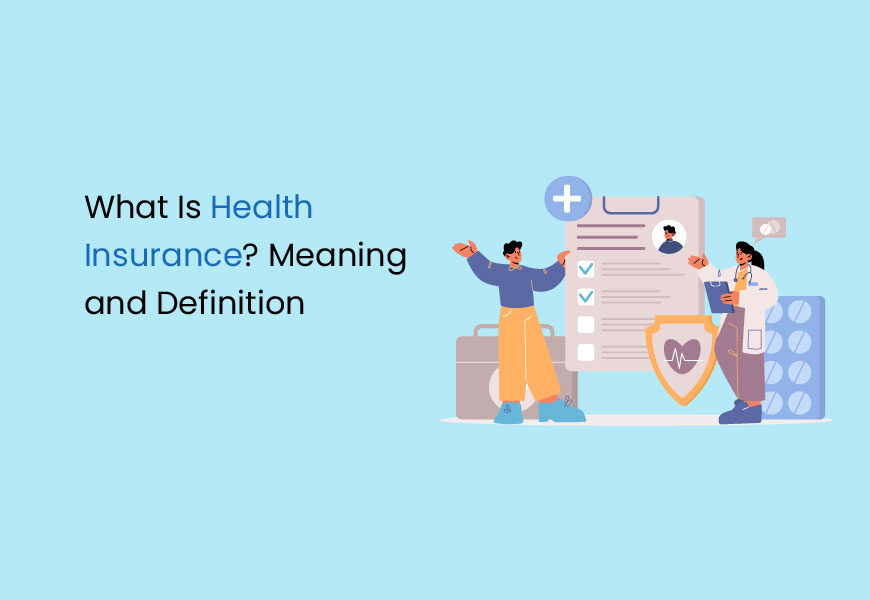Globally, health expenditure has skyrocketed even higher than the medical inflation. This has made health insurance a necessity for everyone. And the Covid pandemic has highlighted this need even more. Health insurance enables people to save for and maintain an emergency fund for medical expenses for oneself and one’s family while also enabling people to meet the rising healthcare costs and inflation. What is health insurance? Why is it so important? Let us find out.
What Is Health Insurance?
Health insurance is a product that assures immediate financial help in case of medical emergencies and covers medical, surgical and other healthcare expenses for an insured person (and their family). It is a contract between the insured person and the insurance company/ organization wherein the latter promises financial protection to the former in the wake of injuries, accidents, illness or other predetermined medical emergencies.
What health insurance does is it covers some or all medical costs for the insured person (and their family), reducing out-of-pocket health expenses that cause major financial setbacks. Based on the type of policy and its terms and conditions, insured persons enjoy cash-free medical treatment or may be reimbursed later.
Types Of Health Insurance
1. Individual Health Plans
Individual health policies cover the medical expenses of a single individual to ensure their financial security in the face of medical emergencies or other health-related issues.
2. Family Floater Plans
Family health insurance plans cover the medical expenses of the entire family under a single policy, including the spouse, dependent children, and parents in case of hospitalization or other medical emergencies. Instead of purchasing individual plans for each family member, one family plan will suffice. These plans are known to provide a higher sum assured than separate individual plans.
3. Group Health Insurance
Group health insurance plans are purchased by a group manager to cover a large number of individuals. This type of health insurance is typically provided by employers to their employees as a benefit. Even colleges, universities and residential associations opt for such policies to provide medical coverage to students/ residents and staff. The policy covers the medical expenses of the insured person in the group and their family members.
4. Government Health Insurance
Government health insurance programs are funded and operated by the government or its agencies to provide affordable health insurance coverage to the citizens of the country. Its main aim is to make comprehensive and timely healthcare accessible to the citizens of the country, especially those who are socio-economically vulnerable.
5. Critical Illness Insurance
These insurance plans provide coverage for critical illnesses such as cancer, heart attack, and kidney failure. The policy pays out a lump sum amount on the diagnosis of any of the covered critical illnesses. These plans can be purchased as a rider to the primary health insurance policy or as a separate policy.
6. Senior Citizens Health Insurance
Senior citizen health insurance policies are designed for people over the age of 60 to cover the medical expenses related to age-related illnesses. These policies are typically more expensive owing to the higher medical costs involved.
How Does Health Insurance Work?
You must apply to purchase health insurance either through an online portal or through an agent. Based on factors such as your age, medical history, type of coverage required, plan type, etc., a premium quote will be generated/ provided. If necessary, you may also be required to give medical tests or get a full medical check-up before the insurer decides on what kind of cover and plan will suit you. The terms and conditions are finalized and you will be provided with your health insurance policy and health card.
Most policies come with an initial waiting period of a few weeks or a month during which you will not be able to make non-emergency claims. After this period, you will be able to access the benefits provided by the plan. Based on the type of policy and its terms and conditions, you will get cash-free treatment at network hospitals or you will have to make the payment upfront and place a claim for reimbursement with the insurance provider.
To enjoy the benefits offered by the policy, you will have to pay premiums on time. Late payments come with penalties or additional charges. Typically, health insurance policies have a policy duration after which it needs to be renewed.
Coverage
The coverage provided by the health insurance plan differs from insurance company to insurance company and based on factors such as age, medical history, etc. Coverage is perhaps one of the most important considerations to make while choosing your health plan. If you choose one with poor/ limited coverage, you will end up paying much out of pocket and leaving yourself open to financial drain.
Benefits of Health Insurance
Equipped To Meet Health Emergencies
One of the key benefits of health insurance is that it equips insured persons and their families to deal with medical emergencies better. They do not have to worry about where to find the money when a sudden hospitalization or illness occurs.
Deal With Medical Inflation
Medical inflation and rising costs of healthcare is a reality. With health insurance, you can protect yourself to a great extent against these rising medical costs.
Financial Security
More than 1 billion people spend at least 10% of their household budget out-of-pocket on healthcare and half a billion people are either pushed or pushed deeper into extreme poverty owing to high expenses made out of pocket. Health insurance can protect individuals and families from financial ruin in case of unexpected medical expenses, such as hospitalization or surgery.
Access To Timely Healthcare – Preventive and Curative
Health insurance provides coverage for a wide range of healthcare expenses including hospitalization, testing, out-patient consultation, specialist consultations, etc. which can help individuals access necessary medical care and treatment in a timely fashion without worrying about the cost.
Critical Illness and Occupational Disease Cover
Certain types of medical insurance policies also cover critical illnesses and occupational diseases, enabling individuals to access proper medical care and treatment.
Extensive Coverage
Several policies including government health insurance schemes like the ESI scheme in India offer comprehensive coverage and benefits to insured persons and their families. This provides them with peace of mind and helps them to improve their overall quality of life through better proper healthcare.
Tax Savings
In many countries, health insurance premiums are tax-deductible and offer additional benefits.
Click Here For More Information – Health Insurance For gig Workers
Health Insurance and Low-Income Groups
Health insurance is particularly more important to people who are socio-economically vulnerable. Let us understand how with an example.
Manju works as a full-time domestic worker earning a total of Rs.10,000 monthly. She is the primary breadwinner of her family of 6 which includes children and aging in-laws. One of her children had a major fall and had to be hospitalized for over a week owing to a major fracture. Manju had to pay for multiple tests, hospital charges, medication, imaging and so on.
Manju did not have health insurance and had to pay for everything out of pocket. As the medical expenses piled up, she was forced to take advances from her employers and borrow money from loan sharks. This was a huge financial setback for her family who were forced to cut down on essentials and they were pushed into deeper poverty. With health insurance, Manju would have been able to get cashless medical treatment for her child or atleast be reimbursed for the medical expenses.
Like Manju, the vast population of informal workers and low-income households fall into financial ruin and deeper poverty owing to sudden medical expenses. With health insurance, they get timely access to healthcare.
Making The Benefits of Health Insurance Accessible to Everyone, Equitably
Despite the importance of health insurance for low-income households, it is not accessible or affordable to them. Given their income level, they may not have any access to private insurance, or the coverage may be minimal. In such a case, health insurance may not be all that beneficial. This is where group health insurance policies and government health insurance schemes are extremely useful.
How Is Government Health Insurance Useful?
Government health insurance policies like the Employees’ State Insurance (ESI) scheme, in particular, are affordable to employers and offer comprehensive coverage to all employees. They only increase the payables marginally for employers but they have a multiplier impact on the health and quality of life of their employees.
However, schemes like ESI have an eligibility criteria which prevents households and smaller employers (such as home businesses) from registering into the scheme. So, informal workers such as domestic workers, casual labourers, temporary workers, gig workers, etc. may still not have access to health insurance.
So… What’s the Way Forward?
The TankhaPay app…
The TankhaPay app enables employers, including households and small businesses, to make comprehensive healthcare benefits and other social security benefits accessible to all their informal workers.
Download the app now and make health insurance accessible to all your employees.





















